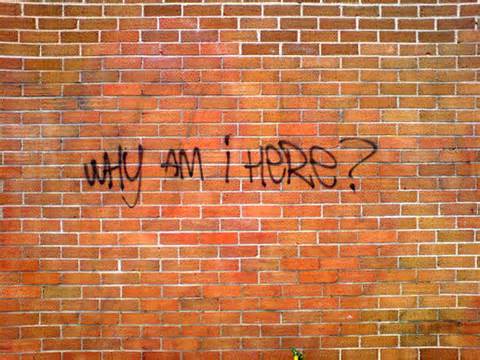Anomie
 Thursday, December 7, 2017 at 12:13PM
Thursday, December 7, 2017 at 12:13PM  Whenever you think of yourself as a nobody, an accident of nature, homeless, nameless, normless, lawless, floating around with no particular place to belong, you are in trouble. (You think?) Now, imagine with me a whole nation of nobodies, an entire population that doesn’t have any deep moorings or anchors, doing whatever, believing whatever, thinking whatever—what do you think their future looks like? People will do anything to achieve significance, even if it leads to crime, abuse, evil or destruction. In a word, it’s suicidal.
Whenever you think of yourself as a nobody, an accident of nature, homeless, nameless, normless, lawless, floating around with no particular place to belong, you are in trouble. (You think?) Now, imagine with me a whole nation of nobodies, an entire population that doesn’t have any deep moorings or anchors, doing whatever, believing whatever, thinking whatever—what do you think their future looks like? People will do anything to achieve significance, even if it leads to crime, abuse, evil or destruction. In a word, it’s suicidal.
We often consider suicide to be the result of deep personal problems. Emile Durkheim, a French social scientist, asked whether the act was really influenced by larger cultural factors. He studied factors like weather, religion and economy, looking for anything that might affect the suicide rate. His seminal 1897 work, Suicide, concluded that the suicide rate was greatly impacted by something he called anomie. Anomie, which literally means “without law,” was defined by Durkheim to be a state of “normlessness,” or “lawlessness.” Durkheim found that in times of social change and upheaval, clear societal standards and expectations for individuals vanish. With no clear rules, norms, or standards of value, people feel anxious, rootless, confused, and even suicidal. In an age of anomie, life can often feel empty and meaningless.
Connecting the dots, “lawlessness” is iniquity in Scripture, translated from anomia in the Greek. “For the mystery of iniquity doth already work.” 2 Thessalonians 2:7. Scholars associate anomie with rootlessness, having no foundation, having to structure or no place to belong. But, that’s not how God operates. Jehovah is a God of covenants, of commandments, of law and order. God didn’t throw some lumber at Noah and say, “The storm’s coming, build something!” No, he gave him a specific set of blueprints to build an ark that would save them from destruction! God didn’t tell Moses “Go out there and build a designer religion. I don’t care what you come up with. Just make it something that you enjoy and seems right to you.” No. Read through Exodus and Leviticus and you’ll find that God meticulously and painstakingly gave Moses and the Israelites precise plans to worship Him. The prodigal son left his home, but discovered that home was not so bad after all. He left his family but found out that his family meant more to him than all the superficial friends in the world.
Today, we have an essentially “normless” society. “Live and let live” reigns. You can marry at twenty or forty, or never, or you can live with someone for decades and never get married. You can have nine kids or no kids, or have your first at age sixty. You can wear what you want without anyone saying anything, date anyone of any age, race or ethnicity, pierce any part of your body, have any kind of sexual orientation, bear a child out of wedlock and still be accepted by others, be a corporate warrior or a stay at home or go back to college at fifty. You can pretty much do whatever you want, short of breaking the law, and suffer few social repercussions. This unfettered personal freedom lets people do whatever or be whomever they wish. Many people think this is a blessing, but in this blessing also lies the curse. It’s anomie.
Be careful when you chafe against the guidelines of the Scriptures. It may feel liberating at first, but eventually, it spirals down into rootlessness. Without God’s law, we have anarchy, anomie, lawlessness and iniquity. With God’s law comes order, meaning, safety, and righteousness. What the world calls a curse, is humankind’s greatest blessing.

Reader Comments